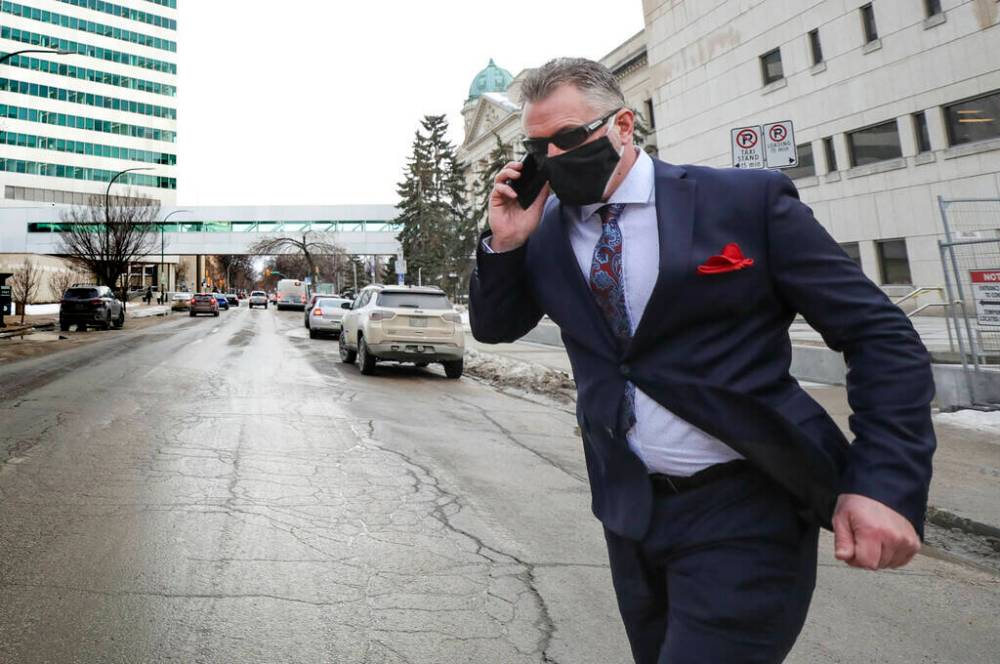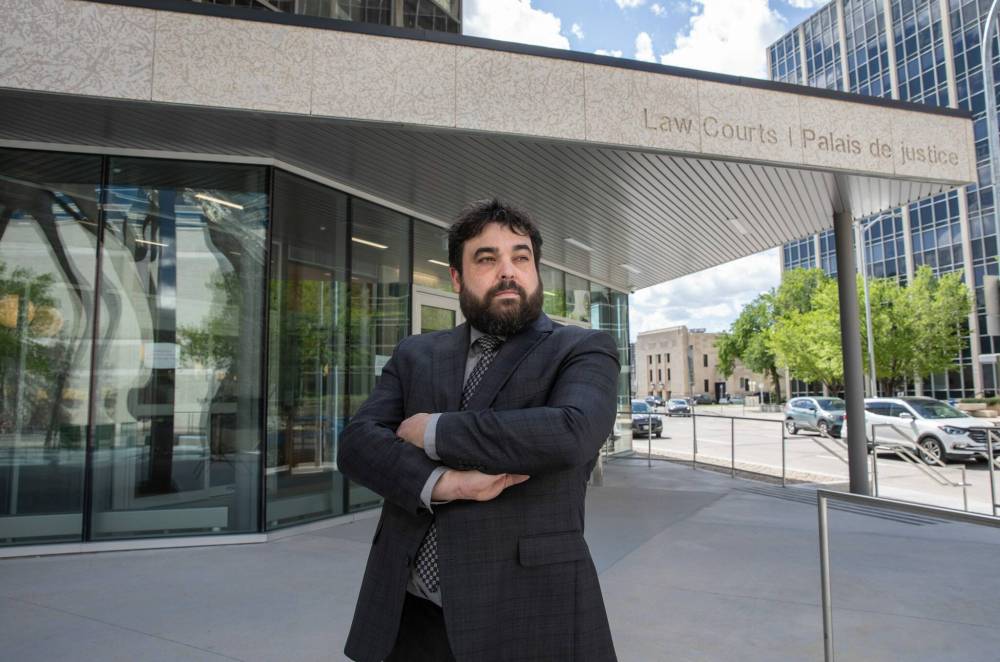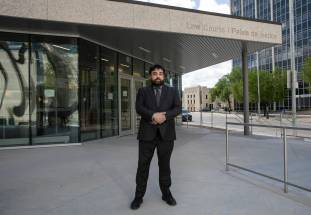A question of trust Manitoba advised to bring back independent prosecutors in wake of officer’s acquittal
Read this article for free:
or
Already have an account? Log in here »
To continue reading, please subscribe:
Monthly Digital Subscription
$0 for the first 4 weeks*
- Enjoy unlimited reading on winnipegfreepress.com
- Read the E-Edition, our digital replica newspaper
- Access News Break, our award-winning app
- Play interactive puzzles
*No charge for 4 weeks then price increases to the regular rate of $19.00 plus GST every four weeks. Offer available to new and qualified returning subscribers only. Cancel any time.
Monthly Digital Subscription
$4.75/week*
- Enjoy unlimited reading on winnipegfreepress.com
- Read the E-Edition, our digital replica newspaper
- Access News Break, our award-winning app
- Play interactive puzzles
*Billed as $19 plus GST every four weeks. Cancel any time.
To continue reading, please subscribe:
Add Free Press access to your Brandon Sun subscription for only an additional
$1 for the first 4 weeks*
*Your next subscription payment will increase by $1.00 and you will be charged $16.99 plus GST for four weeks. After four weeks, your payment will increase to $23.99 plus GST every four weeks.
Read unlimited articles for free today:
or
Already have an account? Log in here »
Hey there, time traveller!
This article was published 01/06/2022 (1286 days ago), so information in it may no longer be current.
Manitoba’s Crown attorney’s office is facing new questions about how it prosecutes police, weeks after a judge acknowledged key prosecutorial decisions forced him to acquit a veteran Winnipeg officer.
Speaking for the first time since the May 9 acquittal, Jamie Cote, who accused patrol Sgt. Sean Cassidy of assaulting him, told the Free Press he feels let down by the Crown’s handling of the case and treatment of him.
“I don’t feel like the Crown attorney was really on my side. He said he believed me completely, but then told the judge not to believe me — that the police were telling the truth and I wasn’t,” Cote, 36, wrote in a statement provided by his lawyer, Karl Gowenlock. “It makes me feel like the case was set up to fail from the beginning. I don’t know how anyone could have faith in that system.”
“It makes me feel like the case was set up to fail from the beginning. I don’t know how anyone could have faith in that system.” – Jamie Cote
Gowenlock said the Crown’s case risks undermining public trust in prosecutions of police officers.
Cote said he has been diagnosed with depression, anxiety and post-traumatic stress disorder since the March 28, 2017, incident.
“I am required to take medication daily now to suppress the regular migraines and headaches I get frequently due to the head trauma I received that night,” he wrote. “The concussion really affected my ability to do physical labour for a long time and I almost lost my landscaping business. That night changed my entire life.”
The Manitoba Prosecution Service is considering appealing Cassidy’s acquittal, a spokesman for the province said.
Cote is proceeding with a lawsuit against Cassidy and the City of Winnipeg, after filing a statement of claim in March 2019.
Cassidy and the city, which declined to comment, have not filed statements of defence. The civil case was paused pending the outcome of the criminal trial.

“Hopefully, this process will be able to provide Mr. Cote due compensation for the financial, physical, and psychological damage that was inflicted upon him, as well as some degree of justice and accountability for those responsible,” Gowenlock wrote in an email.
Last month, provincial court Judge Sidney Lerner found Cassidy not guilty of assault causing bodily harm. He said the Crown’s decisions gave him reasonable doubt as to the officer’s guilt.
In the wake of the trial, Gowenlock wants Manitoba Justice to return to using independent special prosecutors in all cases involving police officers.
“Only they can prosecute the case without conflict and, just as importantly, the appearance of conflict,” he wrote. “The solution is very clear, but it would cost Manitoba Justice more money. Personally and professionally, I feel that’s a small price to pay to maintain public faith in the justice system.”
The province tends to use a Crown attorney from a different region in Manitoba who has no “previous association” with an accused officer or witness officers.
“Personally and professionally, I feel that’s a small price to pay to maintain public faith in the justice system.” – Karl Gowenlock
Brett Rach, a Crown who normally works in Brandon, was the prosecutor in Cassidy’s case.
A spokesman for the province said the Manitoba Prosecution Service “carefully” reviews each case and considers whether independent counsel is required.
“Manitoba Crown attorneys take their role seriously and a fair and just prosecution is always the goal, but it is understandable that someone may be disappointed in the outcome of a case if it does not go their way,” the spokesman wrote in an email.
Brandon Trask, an assistant professor of law at the University of Manitoba, said the use of a private lawyer or a prosecutor from a different province is “worth considering” given public perception.
“Justice must be done, but it must also be seen to be done,” said Trask. “(Crown attorneys) are intended to be independent from police, and it can always be awkward in that role because, at times, a Crown can be asked to give legal advice to police.”
Cassidy had been accused of following Cote from La Salle to Winnipeg and punching him in the head during what was alleged to be a “high-risk” traffic stop.
“Justice must be done, but it must also be seen to be done.” – Brandon Trask
In court, Cassidy claimed Cote chased his van out of La Salle at high speed, after the off-duty officer followed the Winnipeg-based landscaper’s vehicle to several houses while returning home from work.
Cassidy told court he became suspicious, as there had been break-ins in the area.
Cote testified he and a roommate were delivering flyers for his business when a van started following them.
After Cassidy called 911, a marked police car was waiting as he and Cote drove into the city on St. Mary’s Road shortly after 1 a.m.
The assault is alleged to have occurred after Cote pulled over and Cassidy arrived at the scene in his van.
Cote told court an officer forced him to the ground on his stomach and another male, alleged to be Cassidy — who wasn’t in uniform, and was not carrying handcuffs or a firearm — punched and kneed him in the face.
Cassidy claimed he tried to pull Cote out of the truck, and punched him because he saw something metal in his hand.
Cassidy said he punched Cote a second time because he was still resisting on the ground.
Crown attorney Rach accused Cassidy of lying about seeing a possible weapon to excuse the assault.
Police officers who responded to the 911 call described “nothing untoward” in Cassidy’s use of force or techniques, the court heard.
Gowenlock said positions taken by the Crown made a conviction impossible, noting the prosecutor asked the judge in a closing submission to accept Cassidy’s testimony about the use of force applied during the arrest.

“I don’t know what the Crown’s reasoning was, and I don’t want to presume, but it is difficult not to see it as a result of the conflict that arises when Crown attorneys are tasked with prosecuting police,” he wrote.
Gowenlock also took issue with the Crown calling the other officers as witnesses for its own case.
“The evidence of the other police present at the arrest was presented as reliable even though it contradicted the evidence of Mr. Cote and, in my opinion, is not consistent with the surrounding circumstances and common sense,” he wrote. “They have a very strong personal stake in providing a version of events where nothing untoward happened at the roadside arrest, because anything else would mean they had some level of culpability, as we allege in Mr. Cote’s civil suit.”
Lerner told court the Crown’s position on Cassidy’s use-of-force testimony called into question all of Cote’s evidence.
At the same time, the judge said he didn’t believe Cassidy’s version of the events in La Salle and during the Perimeter Highway chase, testimony on which Cassidy was not cross-examined by the Crown.
Lerner told court he had to acquit Cassidy because he was “in a position of uncertainty as to who, and what, is to be believed in this case.”
In response to Cote and Gowenlock’s comments, Lisa LaBossiere, who represented Cassidy during the trial, said it would be “inappropriate” for anyone to comment on the prosecution’s handling of the case “without having complete disclosure, understanding Crown strategies and responsibilities, and sitting through the entire trial.”
Gowenlock said he wants to know what, if any, consequences Cassidy faced within the Winnipeg Police Service, calling its internal process “opaque.”
Winnipeg police refused to disclose how it handled the matter internally.
“Patrol Sgt. Sean Cassidy was acquitted on charges of two unrelated matters on March 10, 2022, and May 9, 2022,” police spokesman Const. Jay Murray wrote in an email. “He has since returned to the workplace.”
Cassidy was acquitted in March of logging into a police database to fix his own school zone photo-radar speeding ticket, despite a judge finding his defence was “almost implausible.”
In 2019, he was charged with unsafe storage of a firearm and possession of a restricted weapon at an unauthorized place.
The first charge was later stayed, and he pleaded guilty to the second charge in 2020, receiving an absolute discharge.
chris.kitching@freepress.mb.ca
Twitter: @chriskitching

As a general assignment reporter, Chris covers a little bit of everything for the Free Press.
Our newsroom depends on a growing audience of readers to power our journalism. If you are not a paid reader, please consider becoming a subscriber.
Our newsroom depends on its audience of readers to power our journalism. Thank you for your support.









